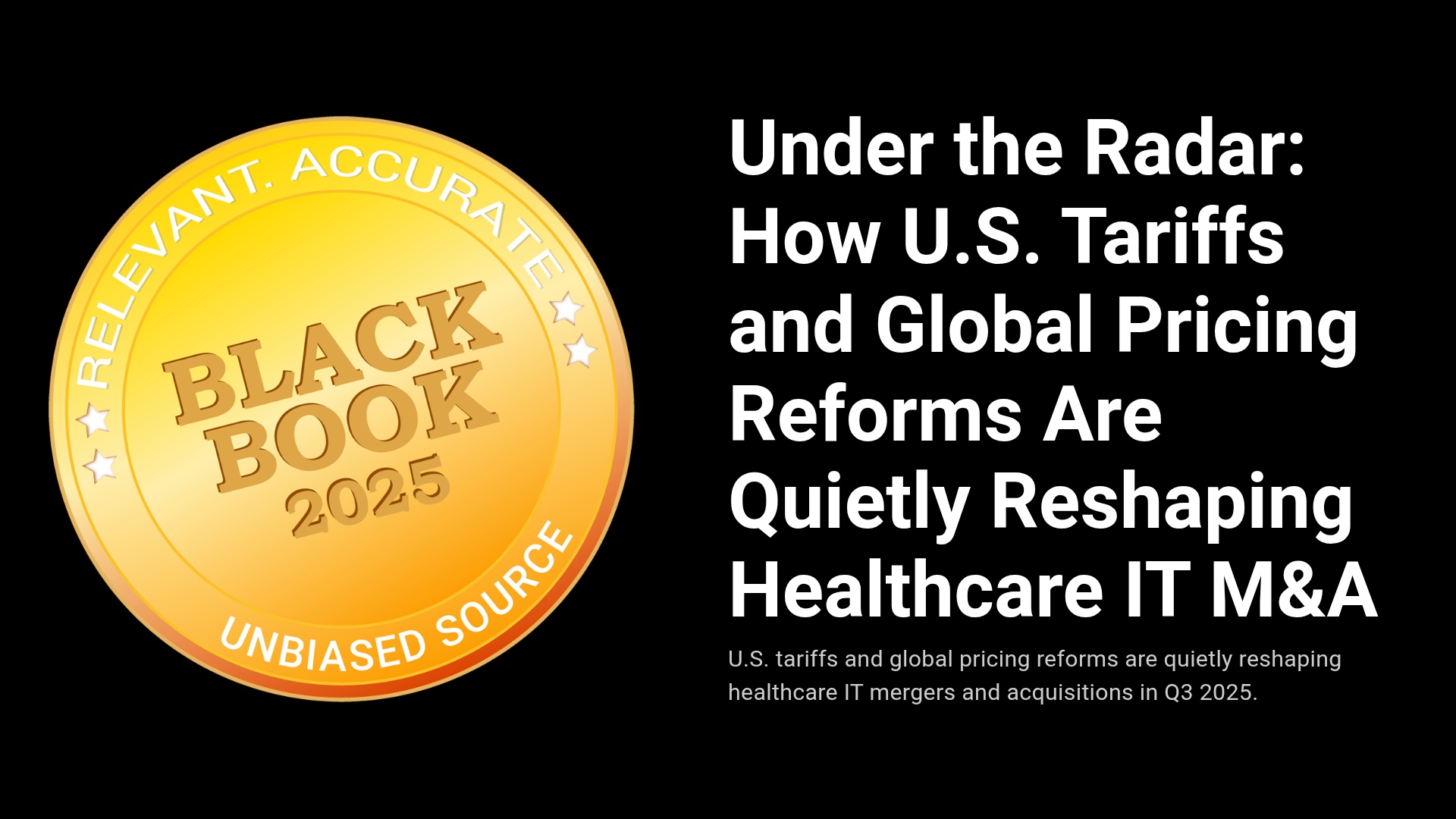Black Book Research Survey Finds Trade Policy Shifts, MFN Enforcement, and Supply Chain Vulnerabilities Driving a High-Stakes Reset in Digital Health M&A Valuations and Deal Structures
NEW YORK CITY, NY / ACCESS Newswire / August 8, 2025 / Escalating U.S. pharmaceutical import tariffs, accelerated Most-Favored-Nation (MFN) drug-pricing enforcement, and mounting global supply chain vulnerabilities are forcing a strategic reset in healthcare IT mergers and acquisitions (M&A). According to Black Book Research's August 2025 flash survey of 211 healthcare M&A professionals, private equity investors, and digital health executives, policy shocks are now as critical as innovation in shaping valuations and deal structures.

Tariffs Take Center Stage
On August 5, 2025, the U.S. administration confirmed a new tariff program on pharmaceutical imports that will begin modestly but is slated to rise sharply reaching 150% within 18 months and potentially 250%. Just three days later, an August 8 update exempted Indian pharmaceutical exports from the new duties following industry warnings of potential U.S. drug shortages. While pharma and certain mobile devices were spared, Indian textiles and jewelry remain subject to steep tariffs, underscoring the selective nature of the carve-outs.
Black Book Stat #1: 92% of surveyed healthcare IT M&A advisors now incorporate tariff and MFN policy simulations into due diligence - a significant jump since the latest announcements.
Legal Uncertainty Adds to Risk Calculations
The tariff environment is complicated by litigation. In May 2025, the U.S. Court of International Trade ruled the so-called "Liberation Day" tariffs unlawful, but the decision is stayed pending appeal. This uncertainty over enforceability is pushing dealmakers to develop contingency strategies for possible reversals or staggered implementation.
MFN Drug-Pricing Enforcement Accelerates
The May 12, 2025 Executive Order, Delivering Most-Favored-Nation Prescription Drug Pricing to American Patients, remains a central force in healthcare investment planning. The policy ties U.S. drug prices for select products to the lowest rates paid by comparable developed nations. In late July, CMS issued guidance detailing calculation methodologies, and on August 5, President Trump directed 17 major drug manufacturers to comply within 60 days. These moves are reshaping multinational reimbursement strategies and altering the risk profiles of globally integrated technology platforms.
Deal Structuring Shifts Toward Flexibility
Firms with exposure to offshore supply chains, pharmaceutical-linked software, or international reimbursement dependencies are pivoting toward protective and adaptable transaction frameworks, including:
Milestone-based earn-outs tied to regulatory and reimbursement milestones
Contingent joint ventures with delayed closing stages
Phased acquisition payments designed to hedge against policy-driven volatility
Black Book Stat #2: More than 67% of digital health acquisitions in H1 2025 used alternative deal structures, up from just 33% in H1 2023. A recent example: a June 2025 joint venture in remote patient monitoring software structured to delay full acquisition until CMS reimbursement stability is expected in late 2026.
Portfolio Recalibration in Private Equity
Private equity groups are shifting capital toward "capital-light" domestic-first healthcare technology platforms, insulating portfolios from tariff shocks and global pricing volatility.
Black Book Stat #3: 80% of Q3 2025 PE healthcare IT investments target companies with predominantly domestic revenue streams and minimal international exposure - such as AI-powered revenue cycle management, telehealth, and behavioral health solutions.
Digital health conglomerates are also divesting high-risk assets tied to offshore manufacturing and global hardware supply chains, instead favoring agile, cloud-native, domestic-first platforms.
Investor Action Items
Reassess M&A targets using tariff- and MFN-adjusted risk models.
Audit exposure to offshore manufacturing, global revenue, and cross-border dependencies.
Adopt flexible transaction terms including earn-outs, phased closings, and regulatory contingencies.
Track policy-sensitive sectors (diagnostics, AI, remote monitoring, and revenue cycle) for consolidation opportunities tied to trade and pricing shifts.
"The Q3 2025 healthcare IT investment climate is now defined as much by strategic insulation as by innovation," said Doug Brown, Founder of Black Book Research. "M&A strategies that once focused primarily on breakthrough capabilities must now account for tariff exposure, MFN compliance, and legal unpredictability as core valuation criteria."
About Black Book Research
Black Book has been the healthcare industry's trusted source for independent, unbiased technology market intelligence since 2004. Engaging over 3 million healthcare executives, clinicians, and investors worldwide, Black Book delivers real-time data, actionable analytics, and proprietary satisfaction ratings to guide technology decisions, investments, and strategic planning. For complimentary industry reports and insights, visit www.blackbookmarketresearch.com.
Contact Information
Press Office
research@blackbookmarketresearch.com
8008637590
SOURCE: Black Book Research
View the original press release on ACCESS Newswire:
https://www.accessnewswire.com/newsroom/en/healthcare-and-pharmaceutical/escalating-tariffs-and-global-drug-pricing-mandates-reshape-q3-2025-h-1053261
